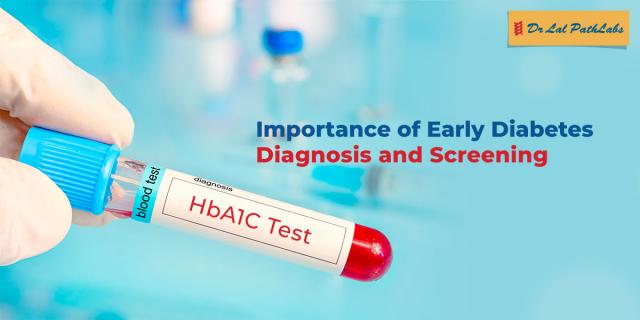Diabetes, a chronic health condition characterised by increased Blood glucose levels, poses significant health challenges. Globally, its impact is quite alarming. A research study by the Global Burden of Diseases (GBD) reveals that 2021 saw an estimated 529 million people with Diabetes worldwide.
These statistics underscore the critical importance of early detection and screening of diabetes through Blood Sugar testing.
What is diabetes?
Diabetes is a chronic disorder that causes elevated blood sugar levels over an extended period. The condition arises when the body cannot produce sufficient insulin or effectively utilise the insulin produced. Insulin is a blood sugar-regulating hormone. Prolonged high blood sugar can lead to serious complications, including heart disease, stroke, kidney failure, and vision problems.
What causes diabetes?
There are several causes of diabetes, which vary depending on the type. Type 1 diabetes is generally due to an autoimmune disorder where the body attacks the insulin-producing cells. Type 2 diabetes, which is more common, arises from a blend of genetics and lifestyle elements like obesity and a lack of exercise.
Are there any risk factors for diabetes?
Here are some risk factors for pre-diabetes and diabetes that people should be aware of.
- Family history of diabetes.
- Obesity or being overweight.
- Age, particularly those over 45 years.
- High blood pressure.
- High cholesterol levels.
- History of gestational diabetes.
How to recognise the symptoms of diabetes?
Symptoms of diabetes can include:
- Increased thirst and urination.
- Unexplained weight loss.
- Fatigue.
- Blurred vision.
- Slow-healing sores or frequent infections.
- Areas of darkened skin.
How is diabetes diagnosed?
Diagnosis of diabetes involves several types of blood sugar testing:
- Fasting Blood Glucose Test: This diabetes test involves measuring blood sugar after an overnight fast. A glucose level of more than 100 mg/dL indicates diabetes.
- Oral Glucose Tolerance Test (OGTT): A diabetes mellitus screening test assesses blood sugar before and two hours after consuming a sweet drink. A two-hour value of 200 mg/dL or more suggests diabetes.
- Haemoglobin A1c Test: Shows average blood glucose over the past 2 to 3 months. A 6.5% or higher glucose level on two separate tests confirms diabetes.
- Random Blood Sugar Test: This type 2 diabetes risk test measures blood sugar at a random time. A blood sugar level of more than 140 mg/dL suggests diabetes.
- Post-prandial blood glucose test: It is also known as the Postprandial Blood Sugar (PPBS) test. This test measures blood glucose levels two hours after eating a meal.
How is diabetes managed and prevented?
Here’s how diabetes can be managed:
- Regular diabetes screening tests are especially important if individuals are at risk for pre-diabetes.
- Routine diabetes screening is important for adults, especially after a certain age.
- Monitoring postprandial blood glucose levels to manage diabetes effectively.
- Screening for gestational diabetes mellitus (GDM screen) during pregnancy.
- Following prediabetes screening guidelines to catch the condition early.
- Adopting a healthy diet and regular physical activity.
Why is early detection of diabetes important?
Detecting diabetes early, particularly screening diabetes type 2, is crucial as it allows for prompt and appropriate intervention. This can help prevent complications such as heart disease, kidney damage, and vision loss.
Early detection of diabetes type 2 can lead to better management and a healthier life. The criticality of identifying symptoms and risk factors, coupled with regular screening for pre-diabetes, cannot be overstated. Such measures can significantly reduce the risks associated with diabetes. Therefore, individuals should remain vigilant regarding their health and seek advice from healthcare professionals for appropriate blood sugar testing.
FAQs
1. Why is screening for prediabetes important?
Testing for prediabetes is vital because it allows individuals to take steps to prevent the progression of type 2 diabetes. A prediabetes screening test is conducted to identify individuals who have higher than normal blood sugar levels but are not high enough to be classified as diabetes.
2. What is a gestational diabetes screening test?
It’s a test conducted during pregnancy to check for gestational diabetes that can develop only during pregnancy. Gestational diabetes screening guidelines generally recommend that expecting mothers must be tested for gestational diabetes at 24 to 28 weeks of pregnancy.
3. At what age should screening for diabetes start?
Regular screening for diabetes should typically start at the age of 45, especially for those at risk. In certain cases of screening for diabetes, age and other factors come after the individual risk profiles.
4. What is the importance of postprandial blood sugar testing?
Post-prandial blood sugar testing helps understand how the body processes sugar after meals, which is crucial for managing diabetes.
5. Is a glucose test for diabetes costly?
Diabetes test prices may vary depending on the type and location of the test.
6. What is retinal diabetic screening?
Retinal diabetic screening involves examining the retina for damage due to diabetes.
This post first appeared on Swine Flu – Causes, Symptoms, Treatments, Compli, please read the originial post: here

